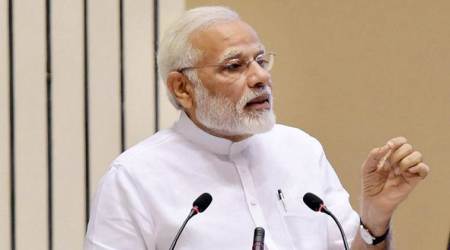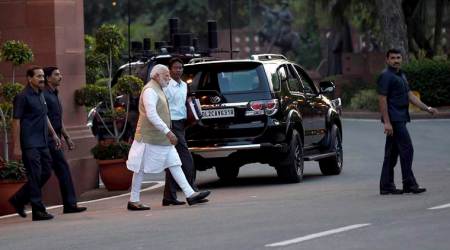 Copies of the book Xi Jinping: The Governance of China on sale at the BRICS Summit venue on Saturday. Reuters
Copies of the book Xi Jinping: The Governance of China on sale at the BRICS Summit venue on Saturday. Reuters
It was on June 1, 1985, his 32nd birthday, that Xi Jinping had come to Xiamen to become its vice-mayor. This coastal city in south-eastern China — located off the South China Sea and opposite Taiwan — was identified as one of China’s special economic zones and Xi took it upon himself to develop the place economically, thus making a mark in one of his early political assignments. More than 32 years later, Xiamen, now a booming and bustling urban centre, will be the stage as Xi, China’s powerful president, hosts the BRICS Business Forum and BRICS Summit, over the next three days.
But, as he engages with the BRICS leaders from five countries and different continents, the recent border stand-off at Doklam between India and China will definitely be on everyone’s minds.
Prime Minister Narendra Modi arrives here Sunday night, and the two leaders will be meeting for the second time within three months. The last time was in Astana, Kazakhstan, at a BRICS leaders’ informal meet, on the sidelines of the Shanghai Cooperation Organisation, when it was still early weeks of the Doklam crisis.
“India attaches high importance to BRICS, that has begun second decade of its partnership for progress and peace. BRICS has important contributions to make in addressing global challenges and upholding world peace and security,” Modi said in a statement on Saturday, obliquely hinting on the need to adhere to “peace and tranquillity” on the India-China border.
An Indian diplomat based in Beijing, who has studied Xi’s political journey, was not surprised that Doklam saw a resolution before the BRICS meeting. The choice of Xiamen as the venue, just a month-and-a-half before the 19th Congress of the Communist Party of China, holds symbolic significance for Xi, on what he has achieved in the last three decades. “This summit being held in Xiamen is a power moment for the Chinese President… Anything that could have cast a shadow on his marquee event had to be done away with. Doklam was one such incident,” the diplomat said.
Indian diplomats in Delhi and Beijing point out that the President takes a lot of pride in his stint in Xiamen, not very common for his otherwise reticent personality.
In 2000, Xi told CCTV, “In June 1985, I went to Xiamen, spending eight hours to get there [by car] from Fuzhou (Capital of Fujian province) due to the poor transportation network.”
The book ‘Xi Jinping — the Chinese Communist Party’s New Leader Who is Standing at a Historical Crossroads’ quotes Xi as saying, “Many Xiamen comrades told me their city was like ‘a beautiful young girl wearing a shabby dress’.”
A biography of Xi published by Taipei-based China Times Publishing in 2012 mentioned that after his long journey getting to the city, Xi decided to build a highway linking Xiamen and Fuzhou.
“Three decades later, Xi — who rose from a mere vice-mayor at Xiamen to the country’s most powerful position — wants to signal about his rise in the party, the State and the world,” the Indian diplomat told The Sunday Express, adding that the summit was “too important” for him and he did not want the border stand-off to queer the pitch ahead of the all-important party congress, scheduled on October 18.
Chinese Ambassador to India Luo Zhaohui, who had played a role during the 10-week Doklam stand-off, also expressed hope on Friday that China and India can open a new chapter in development of bilateral relations, taking the BRICS Summit as an opportunity.
Modi, in his statement on Saturday, said, “I will visit Xiamen, China, for the 9th BRICS Summit from 3-5 September 2017. India had the privilege of hosting the previous Summit in Goa in October last year. I look forward to building upon the results and outcomes of the Goa Summit. I also look forward to productive discussions and positive outcomes that will support the agenda of a stronger BRICS partnership under the chairmanship of China.”
“In addition, I look forward to engaging with leaders of nine other countries, including BRICS partners, in an Emerging Markets and Developing Countries Dialogue, hosted by President Xi Jinping on 5 September,” adding that he will have the opportunity to meet leaders “bilaterally” on the sidelines of the Summit.
In an interview with Xinhua on Friday, Luo said both China and India are important BRICS members and China is willing to strengthen cooperation with India in the framework of BRICS. He said that frequent interactions between leaders of the two countries have greatly pushed forward pragmatic cooperation and enhanced political mutual trust.
Luo stressed that China and India, as important neighbours, have a great potential for cooperation in various fields. He said that such cooperation has become even more important against the backdrop of rising anti-globalisation and anti-free trade trends in the world. He also pointed out that bilateral economic and trade cooperation between China and India has entered a new stage with the trade volume exceeding 70 billion US dollars last year and China becoming India’s largest trading partner.
“China and India need to further promote economic development and achieve a win-win situation from bilateral cooperation as both countries are now focusing on economies,” said the ambassador.
Luo stressed that China and India, both developing countries, share similar views on regional and international issues and enjoy cooperation in many fields such as globalisation, climate change and promoting a new just economic and political international order, as well as in multilateral institutions like the BRICS and the Shanghai Cooperation Organization.
Ahead of the BRICS Business Forum, Jiang Zengwei, Chairman of the Organizing Committee of the BRICS National Business Forum and President of the China Council for the Promotion of International Trade, said Saturday, “Global trade appears to show signs of picking up, but risks still exist. BRICS countries need to tackle the symptoms and through joint action, create a favourable trade environment.”
The BRICS Business Forum, which will take place on Sunday, will be attended by 1,200 delegates from 25 countries, including 95 from India.

